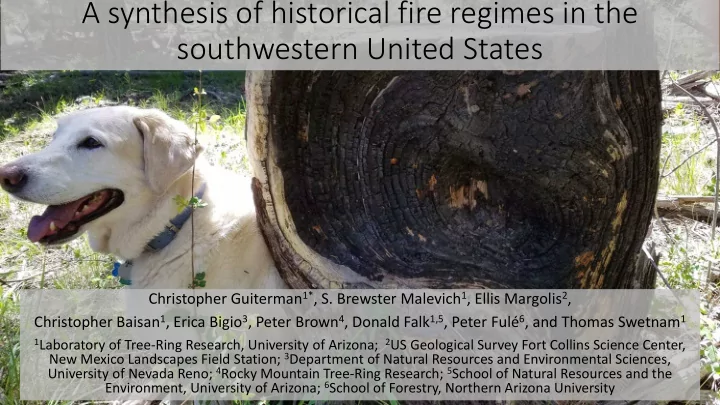

A synthesis of historical fire regimes in the southwestern United States Christopher Guiterman 1* , S. Brewster Malevich 1 , Ellis Margolis 2 , Christopher Baisan 1 , Erica Bigio 3 , Peter Brown 4 , Donald Falk 1,5 , Peter Fulé 6 , and Thomas Swetnam 1 1 Laboratory of Tree-Ring Research, University of Arizona; 2 US Geological Survey Fort Collins Science Center, New Mexico Landscapes Field Station; 3 Department of Natural Resources and Environmental Sciences, University of Nevada Reno; 4 Rocky Mountain Tree-Ring Research; 5 School of Natural Resources and the Environment, University of Arizona; 6 School of Forestry, Northern Arizona University
63 sites Swetnam and Betancourt 1998, Journal of Climate
Data sources: • International multiproxy paleofire database (IMPD) • Fire and Climate Synthesis Project (FACS) • New contributions • 414 sites • 5,039 trees • 37,220 fire scars
Objectives • Quantify the spatiotemporal variability of regional fire-scar records: Pyrodiversity • Seasonality • Fire frequency and change • Interannual fire-climate relationships • Elucidate the strength of climate in driving fire regime metrics • Identify and understand human-fire interactions
Late earlywood Dormant Photo credit: T.W. Swetnam, http://www.ltrr.arizona.edu/~sheppard/swland/scar.jpg
Image courtesy: Mike Crimmins
Swetnam and Betancourt 1998, Journal of Climate
Multi-decadal fire frequency • Individual sites > 300 years • Sorted based on clustering of overall pattern
Swetnam and Betancourt 1998, Journal of Climate
Swetnam and Betancourt 1998, Journal of Climate
PDSI: Cook et al. 2010, Journal of Quaternary Science : Living-blended drought atlas
There’s great value in historical pyrodiversity
THANK YOU Want to contribute to a North American network? Join us at 5:20, Rincon room
Recommend
More recommend